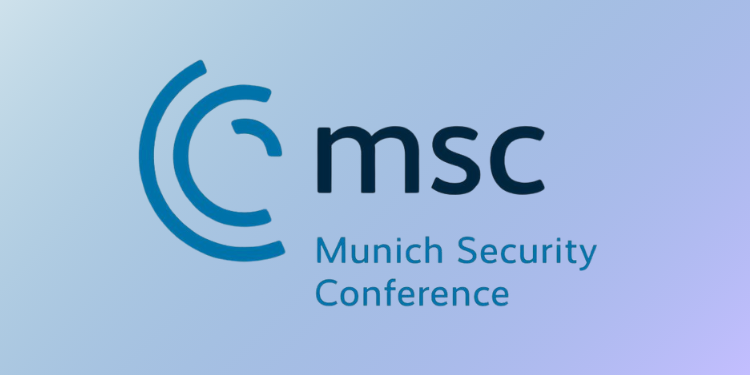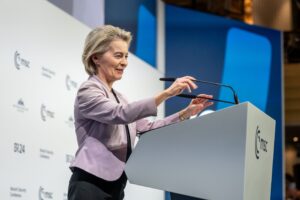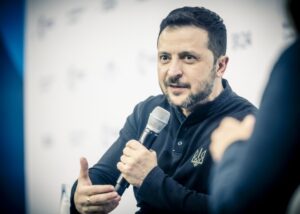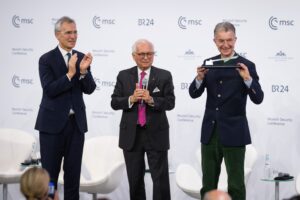MSC 2025: A defining moment for the future of European security and traditional transatlantic relations
The 61st Munich Security Conference (MSC), held from February 14–16, 2025, proved to be a decisive moment in global security discussions. With pressing issues such as Ukraine, transatlantic relations, and European defence autonomy at the forefront, the conference highlighted deepening divisions between the U.S. and Europe and the pressing need for Europe to rethink its security strategy. But was this truly unexpected, or had the warning signs been there all along?
Among the many participants closely following the discussions was EUROMIL’s President Emmanuel Jacob. Witnessing the debates first hand—and at times with some frustration—he observed how little attention was given to the most essential capacity of the armed forces: the men and women in uniform.
Day 1: Europe’s commitment to Ukraine and its future and American scepticism on the matter
The MSC 2025 kicked off its first day with European Commission President Ursula von der Leyen reaffirming Europe’s unwavering support for Ukraine, highlighting that the EU has already pledged over €134 billion in aid and defence support. She stressed: “Ukraine’s future is in Europe.”
Ukrainian President Volodymyr Zelensky held a crucial meeting with US Vice President JD Vance, during which he made it clear that Ukraine would only enter into peace negotiations with Russia on the condition of strong security guarantees.
“I will meet only with one Russian, Putin, and only after we have a joint plan with [President] Trump and Europe,” Zelensky said. He also advocated expanding the Ukrainian army to 1,5 million, stressing that military strength was the best guarantee of security. Ukraine has learned this through experience—perhaps it’s time for European countries to take note as well.
Tensions rose, however, when JD Vance later delivered a provocative speech, criticising European governments for what he called a retreat from democratic values. His remarks, suggesting that Europe itself, rather than Russia or China, posed the greatest risk to stability, sparked controversy and frustration among European leaders far beyond the safety of the MSC 2025.
Day 2: An unexpected call for European armed forces and a visibly growing transatlantic divide
Day two of MSC 2025 saw renewed calls for European autonomy in defence, as Zelensky made a historic call for a united European army.
“I really believe that the time has come. The armed forces of Europe must be created,” he declared, arguing that Europe needed a stronger collective defence mechanism that went beyond dependence on NATO and the US.
The reactions were mixed, but the loud applause from the audience was heart warming and telling. German Chancellor Olaf Scholz subsequently reaffirmed Germany’s commitment to democratic sovereignty and made clear that Europe will not allow outside forces to interfere in its security policy. This is a clear reference to the growing American political influence in European affairs, as again demonstrated by JD Vance’s speech and overall talks in Munich.
The backlash against JD Vance’s remarks grew throughout the day. German Defence Minister Boris Pistorius responded: “Our democracy throughout Europe was called into question by the American vice president… This is unacceptable.” This reinforced the growing sense that Europe must determine the future of its own defence.
That same day, a panel of European foreign ministers from Germany, Poland, France and the United Kingdom debated Europe’s global security role, with German Foreign Minister Annalena Baerbock made a powerful statement stressing: “Peace in Ukraine cannot be dictated without European involvement.”
Day 3: US-Russia talks and growing frustration in Europe
Despite a full agenda for the final day of MSC 2025, the talks took a dramatic turn due to reports that the US was preparing peace negotiations with Russia in Saudi Arabia, without European representation. It was also unclear whether and in what way Ukraine would be involved.
This revelation led to an immediate reaction from several European leaders. French President Emmanuel Macron announced an emergency meeting of a number of European leaders and the UK to formulate a strategy in response to Europe’s exclusion from the talks.
Meanwhile, Finnish President Alexander Stubb outlined a three-phase approach to Ukraine’s security during a debate:
- A Pre-negotiation phase to strengthening of Ukraine’s military position
- Ceasefire negotiations to ensure that Ukraine is not pressured into agreeing to unfavorable terms
- A long-term peace strategy to maintain sanctions against Russia to prevent future aggression
Stubb also criticized the American approach, warning that a peace deal without European participation would be neither legitimate nor sustainable. Europe’s exclusion from these discussions has heightened concerns about the future of transatlantic cooperation, with European leaders now openly discussing ways to reduce dependence on the US.
“Europe needs to get its act together if it wants to play a role in Trump’s planned peace talks with Russia,” Stubb warned. Speaking at the POLITICO Pub, he criticized Europe for “talking a lot and doing little,” adding: “Right now, the ball is in our court.” Amid what he called a “diplomatic cacophony,” Stubb urged calm: “Slow down, take an ice bath, go to the sauna, reflect, and find a solution.”
Key Findings: A Changing Global Security Order
MSC 2025 somewhat unexpectedly revealed major geopolitical shifts that could redefine the European security strategy for the coming years:
- Europe remains committed to Ukraine but is increasingly aware of the need for greater military and strategic autonomy.
- The gap between the US and Europe has widened, especially when it comes to Ukraine, democracy and future security policy.
- The idea of a European army has gained popularity, but there are still major differences of opinion about its feasibility and the necessary political will.
- The US decision to exclude Europe from peace talks caused unrest and led to discussions about Europe’s need for a more independent role in global diplomacy.
EUROMIL’s perspective: the missing voice at MSC 2025
As the debates on MSC 2025 unfolded, one crucial topic remained largely absent from the high-level discussions: the people behind the security policies, the men and women in uniform. As EUROMIL President Emmanuel Jacob has again noted, the discourse among high-ranking politicians, military leaders, think tanks, lobbyists and consultancy firms has been dominated by strategy, geopolitics and financial imperatives, while the essential human factor in the armed forces has been ignored. While countries pledged billions in defence spending and discussed military structures, little attention was paid to the daily reality of military personnel, their working conditions, well-being and rights. This gap in the conversation is precisely why EUROMIL held (individual) discussions during MSC 2025, to ensure that the voices of uniformed personnel were heard.
“Defence is not just about budgets, industry and strategy, it is also about people. It is about the men and women who serve in uniform, their conditions, their rights and their future. During MSC 2025, EUROMIL worked to spread this message, and we will continue to do so.” Emmanuel Jacob, President of EUROMIL, said in closing remarks at MSC 2025.
The way forward?
As the MSC 2025 concluded, it became clear that Europe is at a defining moment. The discussion needs to continue and urgently formulate some answers to questions such as:
- Should it pursue a more autonomous defence strategy or continue to rely on transatlantic cooperation?
- How can it ensure that its voice is heard in peace negotiations for Ukraine?
- What role will the military and security forces play in this changing landscape?
As leaders debate major security issues, EUROMIL will keep the focus on the people behind these policies. EUROMIL will continue to advocate for the rights and well-being of military personnel in the future, ensuring that the human dimension of security is never overlooked.
Preview of MSC 2026
As MSC 2025 ended, the conference also marked the departure of its Chairman Christoph Heusgen, who played a crucial role in shaping the MSC as the premier global security forum in its current form. Heusgen stated that this conference began as “a transatlantic conference, but after Vice President Vance’s speech, we must fear that our common values are no longer as common as they once were.” He then broke into tears, adding, “This is now becoming a difficult moment.”
EUROMIL expresses its sincere gratitude for his leadership and dedication over the years. At the same time, we welcome Jens Stoltenberg as the new Chairman of MSC and look forward to his vision on addressing the complex safety challenges ahead.
EUROMIL thanks the entire MSC team for an excellent and impactful conference and looks forward to continuing its involvement with MSC 2026 and ensuring that the voice of military personnel remains at the heart of security discussions.




